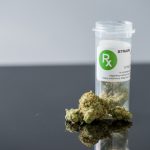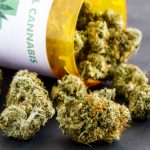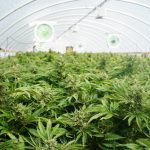Barriers to Medicinal Cannabis: An Interview with Medical Cannabis Advisory’s Grace Sands

Last week, a Greens motion passed through federal parliament that allows terminally ill patients faster access to cannabis medicines. These patients are now able to import up to three months’ supply of medical marijuana from regulated markets overseas.
The disallowance motion amended changes that the Turnbull government made to the Therapeutic Goods Administration’s (TGA) Special Access Scheme (SAS) last year.
Terminally ill patients can now access medicinal cannabis products via Category A of the SAS. This means doctors can simply notify the TGA that a patient who is dying will benefit from cannabis medication, rather than having to apply for permission.
Prior to this, terminally ill patients had to go through the complicated Category B process, which could take up to 6 months.
The Therapeutic Goods Administration
The TGA is the body that regulates the supply, import and manufacture of therapeutic goods in Australia. These goods include medicines, medical devices and what are deemed prohibited substances.
If these products are to be legally available on the Australian market, they must be entered into the Australian Register of Therapeutic Goods (ARTG).
The TGA scheduling standard is a national classification system that controls how medicines and poisons are made available to the public. Schedule 4 contains substances that are prescription only medicines, while schedule 6 contains highly toxic substances or poisons.
Prohibited medicine
Currently, there are tens of thousands of Australians using cannabis products to treat their illnesses. These range from people with cancer treating the nausea associated with chemotherapy, to patients with multiple sclerosis, and children suffering Dravet syndrome.
However, under the TGA system, the cannabis that most of these people are using is classified as a schedule 9 prohibited substance. This means that not only are patients suffering debilitating conditions, but when they – or their carers – source their medicine, they’re criminalised for it.
As of November 1 last year, the TGA down scheduled certain manufactured cannabis medicines to a schedule 8 controlled substance. However, the majority of patients don’t have access to these products.
Legislating for a change
Back in November 2014, now Australian Greens leader Richard Di Natale introduced the Regulator of Medicinal Cannabis Bill into federal parliament. It was designed to set up an independent regulator, bypassing TGA restrictions.
Many medicinal cannabis advocates consider this as a landmark bill. However, it didn’t have the support of the Coalition government.
Instead, in February last year, federal parliament passed the Narcotics Drugs Amendment Bill 2016, which established a framework allowing for the legal cultivation, manufacture and distribution of medical marijuana, in accordance with TGA guidelines.
This system has been widely criticised as establishing a slow moving process held back by excessive red tape.
In February, Australian health minister Greg Hunt announced an interim medical marijuana importation scheme, to help fill the gap in the local market, while domestic production actually gets up and running.
The first two batches of imported medicine from Canada arrived in the country in early May.
At the state level
Under the Turnbull government’s federal system, state governments are required to set up their own legislative framework to allow access to cannabis medicines.
In March this year, NSW Opposition leader Luke Foley introduced the Public Health (Medicinal Cannabis) Bill 2017, which many advocates are lauding as a ground-breaking development that could mark the way forward.
A long time medicinal cannabis advocate
The Medicinal Cannabis Advisory Group Queensland has been lobbying for law reform for years now. The group was instrumental in helping Lanai Carter and her son Lindsay become the first people to gain approval to be able to import cannabis oil into the country.
Sydney Criminal Lawyers® spoke with Grace Sands, co-founder of the Medicinal Cannabis Advisory Group about the legalities that are slowing down patients’ access to medicinal cannabis, and the paths that could be taken change this.
Last week, a Greens motion passed through the Senate allowing terminally ill patients faster access to imported medicinal cannabis under Category A of the SAS.
What do you think about this development? And what sort of outcomes will this have for these terminally ill patients?
We’re very pleased that Senator Di Natale’s disallowance motion was supported this time around, as it has reversed some very unfair and discriminatory changes the government made in November last year that actually removed access to all cannabis medicines under Category A.
The motion has reinstated Category A rights that have been available since 1991 for patients with life-threatening conditions to be able to access any unregistered medicine.
It doesn’t solve all problems with access. But Category A provides fast-tracked access as doctors only need to notify the TGA that they’re treating their patient with an unregistered medicine, instead of waiting days, weeks or months for TGA approval under Category B.
It also puts the decision-making back in the hands of the doctor and the patient instead of people who are far removed from the patients care.
We’re hopeful that the federal government will now change the current policy on the products that are being imported in bulk supplies, as these can only be accessed through Category B or an authorised prescriber.
If patients are not allowed to access these products their doctor or a pharmacist will need to apply to the Office of Drug Control (ODC) for an import licence and then import the cannabis from overseas which can take months.
There’s also an issue with some overseas suppliers, who are not willing to export single shipments to Australia.
We also need the states to respect the Senate’s decision and not make doctors go through the current state approval process, as it can also take months. We have suggested that doctors could notify the state health departments instead.
The TGA can now focus on processing Category B applications for other patients that are trying to access cannabis for non-life threatening conditions.
It’s taken 7 months of campaigning for Category A access to be reinstated. But this issue has also put the focus back on patients and the difficulties with trying to access cannabis medicines through the TGA pathways and state processes.
There’s still lot more that needs to be done.
So even though, they allowed terminally ill patients access via Category A, these patients aren’t able to access the cannabis medicines that are being imported into the country?
No. At this stage, the government is still restricting access to imported products through Category B and authorised prescribers only.
These are the conditions of the current importing licences. The imported cannabis medicines can only be supplied if a community doctor has Category B approval from the TGA, or if the doctor is an authorised prescriber.
This was a policy decision – not law. No laws need to be changed as the provisions to supply cannabis under Category A are already in the TGA regulations.
What is needed is for the government to change its policy. As soon as that happens the current licences can be amended to allow supply via Category A.
If patients can’t access the products that are already being imported into the country, they will need either their doctor or a pharmacist to apply for an import licence.
The overseas supplier also needs to apply for an export licence and permit for each shipment. However, this can take months and a number of overseas companies have already indicated that it’s not commercially viable for them to export cannabis to Australia in single shipments on a case-by-case basis.
So even though they can gain access federally via the TGA, patients still need to obtain state approval via a doctor?
Yes, under Australia’s federated system of government, community doctors still have to comply with state and territory laws. Most states have requirements for doctors to obtain state approval, which can be a very lengthy bureaucratic process.
Some states have put in easier access provisions at the state level. While other states, especially Queensland, have a very complex and duplicative process for accessing schedule 8 cannabis and THC medicines.
Queensland Health have also recently advised that doctors need state approval for schedule 4 cannabidiol (CBD) prescription products.
South Australia has the most progressive access laws at the moment. Doctors can prescribe two months’ supply of schedule 8 cannabis products for patients who are terminally ill, without the doctor needing state approval.
So access can be fast-tracked in South Australia for terminally ill patients. And doctors don’t need state approval for schedule 4 CBD.
Over the last half decade, there’s been a lot of campaigning and law reform around accessing medicinal cannabis.
Currently, how many Australian patients are actually being approved access to this medicine?
It was recently raised in the Senate estimates hearings that the national system was being established to supply up to 30,000 patients. But there aren’t many.
During the Senate estimates, the TGA advised the Senate that there has only been 66 SAS prescriptions approved since January 2016 and 41 patients have been prescribed cannabis through the Authorised Prescriber (AP) scheme.
The prescriptions through authorised prescribers would have been for Epidiolex, which is a schedule 4 CBD. This is medicine being provided to children with epilepsy in hospitals in NSW and Queensland.
So this is to access imported products?
Yes. Currently, the only legal products that patients can access in Australia need to be imported, as the local commercial industry is still not established. And to date, regulations have not been made for an alternative supply under state laws.
How easy is it for these people to actually obtain the medicine once they do get a prescription?
We’re talking about a doctor giving notification under Category A or getting approval under Category B.
As mentioned before, if patients can’t access the products that are already being imported into the country, they will need their doctor or a pharmacist to apply for an import licence. The overseas supplier also needs to apply for an export licence and permit for each shipment.
However, a number of overseas companies have already indicated that it’s not commercially viable for them to export cannabis to Australia in single shipments on a case-by-case basis, even if its 3 months’ supply or more. If they do export it, they want payment upfront before the company will do so.
On the other hand, if patients could access the cannabis medicines that have already been imported, they would only need to pay for one bottle or package at a time.
Greg Hunt announced that delays with importing were one of the main reason why the government was allowing access to these bulk supplies of imported medicines.
Some patients could also pay for 3 or 6 months’ worth of product, but by the time it arrives in the country, the patient may only use a small amount before they pass away, or it may not be suitable for their condition.
Sadly, they may not even get to use it at all.
There are literally tens of thousands of patients using medicinal cannabis medicines in Australia, who don’t have legal access to the product.
What is it like for these patients who are already ill to have to access a medicine that’s classed as illegal?
Patients and carers don’t like having to break the law, but they’re doing what is necessary, because the federal and state governments have not made any changes at all to regulate the cannabis that patients are actually using.
The cannabis that we are all mostly using is still lumped in schedule 9 by the Commonwealth. And although, the states don’t have to adopt the scheduling into law, none of the states have made any changes to provide patients with legal protection if they are growing their own cannabis.
And there have been no provisions under state laws for a more affordable supply chain through compassionate or not-for-profit organisations.
The states have only introduced laws that provide legal access to cannabis from federally licensed importers, or from the licensed suppliers when the Australian industry is established.
No provisions have been made that give any relief or protection to the patients that are out there now growing their own cannabis and making their own oils or trying their best to help other patients who can’t grow their own.
Parents are also at the added risk of the intervention of child services. So there really needs to be an alternative system introduced under state laws, instead of only having the Commonwealth government’s corporate TGA model.
Despite some of the barriers, there have been some other developments that might assist patients.
Greg Hunt’s office and the ODC have recently confirmed that there are provisions in the Narcotic Drugs Act that actually remove the need for doctors to obtain TGA approval if cannabis medicines are dispensed to patients through public hospital pharmacies.
Public hospital pharmacies don’t need a GMP (good manufacturing practice) licence if cannabis medicines are extemporaneously compounded for a patient and dispensed through a hospital pharmacy.
At a recent meeting, the head of the children’s hospital here in Brisbane confirmed this. They also confirmed that the hospital can fund unregistered medicines under an existing individual patient approval scheme that is already available in Queensland hospitals.
There are still issues with doctors prescribing in the public system, but knowing this information may help some patients, who cannot afford to see a private specialist, or the costs of some of these legal medicines.
You’ve said that at the federal level cannabis is still classified as a schedule 9 substance – a prohibited substance – by the TGA. But you’ve also said that its schedule 8 at times.
Cannabis and tetrahydrocannabinols (THC) were down scheduled to Schedule 8, when it is supplied through the national cultivation scheme, or imported from an overseas licenced manufacturer, or one of these approved importers.
As mentioned earlier, the cannabis that the majority of patients are actually using and are at risk of being arrested for, is still in schedule 9.
So that’s the imported medicine?
Imports are schedule 8. But the cannabis that people are growing and making into oils themselves, or obtaining from compassionate suppliers, or on the black market that is still schedule 9, and it’s still a criminal offence under state laws.
In 2015, you put together a proposal for patients to be able to access all cannabis in Queensland. The proposal included providing access via the Special Access Scheme. However, the government only changed the laws to allow access through the scheme.
Can you tell us a bit about what that involved? And why it didn’t progress any further in regards to the cannabis that is still classified as illegal?
We put in a submission to change the prohibition laws here in Queensland to allow patients to access medicine through the federal system. The state government did that in December 2015. So patients have been able to access imported products.
However, there has been no progress with cannabis that remains under Schedule 9.
Our submission was before the Queensland government, prior to Turnbull government’s bill being passed.
It was really looking at Senator Di Natale’s bill, which still would have taken time to roll out. But, it proposed to give patients immediate access to products instead of waiting years for research trials.
We also proposed that the government introduce a state register, very similar to what is proposed in Luke Foley’s NSW bill. It contains provisions for patients giving them legal protection to possess black market cannabis, as well as provisions for patients to cultivate their own cannabis.
Our submission actually included provisions to bring all patients under a legal framework administered by the health department, instead of patients remaining criminalised under state law.
So you’re talking about allowing people who are sick and don’t have enough money to afford imported medicines to actually just grow medicine in their backyard and use it to heal themselves.
Yes. Most patients can’t afford to pay for their cannabis.
We could actually end up with a situation here in Australia where locally produced cannabis medicines are more expensive than imported products, due to the way the government has set up the national system, as industry needs to comply with so many federal and state laws.
Under the current TGA model, companies need to put each product through research trials to have the data available for them to evaluate the product for safety so it can be included on the Australian Register of Therapeutic Goods (ARTG), which is a lengthy and expensive process.
Products also need to be registered on the ARTG before a company can apply for it to be subsidised on the pharmaceutical benefits scheme (PBS), which is another lengthy and expensive process.
So it’s possible that Australian grown and manufactured medicines could end up being more expensive, than the products that are imported from overseas.
Whereas, overseas patients access cannabis as an unregistered medicine upon the recommendation or certification of their doctor. This all occurs outside of the TGA/FDA (US Food and Drugs Administration) prescription model.
The cannabis medicines being used in trials are also not registered. They come from international companies that already import into Australia.
Most of the companies lining up to supply cannabis have also partnered up with producers overseas, and will be growing strains form overseas.
So it’s really unfair for small Australian producers to have to comply with so many barriers at the Commonwealth and state level.
Senator Di Natale tabled a bill in 2014 that was going to establish a federal framework that bypassed the TGA. But, what actually happened was the Turnbull government passed a bill in February 2016, which was done in accordance with TGA guidelines.
Why is it preferable to bypass the TGA? Why is the TGA problematic in this case?
The aim of what the TGA has set up is for medicines to go through research trials and to be registered on the ARTG.
Whereas, Senator Di Natale’s bill proposed to establish an independent regulator to oversee a national cultivation, production and supply licencing scheme for immediate supply to patients.
But, it also left the option for companies to go down the TGA clinical trial and registration pathway.
It aimed to establish an industry similar to the Canadian or US system where licenced producers can supply unregistered cannabis medicines as long as a doctor has certified that the patient has a condition that may benefit from cannabis.
Most countries overseas that allow cultivation and production, have standards in place and most started with access to dried buds. Some even allow for home growing.
But that’s not what’s going on with access under the TGA Special Access Scheme, as there have been so many barriers put in place that make access almost impossible. And the SAS was not set up as a permanent system to access unregistered medicines on a long-term basis.
Overseas they have put in place some cultivating and manufacturing standards, most of which are not complaint with GMP, but they are to food standards or complementary medicine standards, rather than as a prescription medicine.
Patients overseas can be certified by their doctor as having a qualifying condition, very much like the Foley Bill is proposing.
A doctor certifies a patient has a condition that may benefit from cannabis. Doctors explain to the patient that the products have not been fully evaluated by the national body, such as the FDA.
Patients must give their informed consent that they are fully aware the cannabis medicines are not registered and assume full responsibility for any adverse outcomes of treatment. So the patients are aware that they haven’t been through clinical trials.
The federal government passed their bill in February last year. And since February this year, at least nine domestic licences have been granted. What has that left us with? Are these licensed businesses going to be able to get actual cannabis medicine into the hands of patients?
Hopefully they will, but it’s going to take some time under our federated system of government, as there’s joint control over nearly every aspect from seed to sale.
For example, companies need to obtain a TGA or ODC manufacturing licence and also an approval from the states to set up a manufacturing plant, so it’s actually a doubling up with many requirements for the Australian industry.
Until medicines are registered, the TGA are only allowing some patients access to some products through the Special Access Scheme, clinical trials and authorised prescribers.
So it’s a very outdated system, which isn’t suitable for cannabis. And it’s very complicated for doctors and patients to navigate as state approval is needed as well.
It’s going to take a lot of time for any of the medicines currently undergoing trials to be listed on the PBS. It could still be years before just for one or two products come out the end of this system and are available on the PBS.
As you’ve just suggested, under the federal framework, state governments still have to legislate their own frameworks. Queensland passed a bill last year, the Public Health (Medicinal Cannabis) Act 2016 and it commenced in March.
How effective has this been?
It’s put in a very complex legal framework for doctors to become authorised prescribers, or to obtain state approval to prescribe medicines even if a doctor has TGA Category B approval. So basically it’s a duplication of the TGA Category B process at a state level.
Doctors must also provide ongoing reports to both agencies.
So if a doctor was wanting to prescribe a medicine under the Special Access Scheme Category A, even though doctors don’t need federal approval, technically under state law – unless the state respects the Senate decision – it appears that doctors will still need state approval.
For all other patients that don’t come under Category A, their doctors will still need to get Category B approval from the TGA. So these patients will also be waiting on their doctors to obtain approval from the state government.
So they have to get a double set of approvals, which is a time consuming process.
Yes. It’s very time consuming. This is why it’s imperative that the states respect the Senate’s decision.
The Special Access Scheme is very much geared towards community doctors when it comes to cannabis medicines. So if a patient can’t go through the public system, they need to see a private doctor.
This is where the TGA and governments are imposing a lot of restrictions and conditions that restrict access, especially at the state level.
What we have suggested is for the states to put in place a system for community doctors to possibly just notify the states, which would be similar to how doctors only need to notify the TGA using the Category A form.
And we’ve also suggested a similar system with access under Category B. If the doctor obtains approval from the TGA, they should only have to notify the states.
If the states provide the medications through public hospitals doctors, then they don’t need Special Access Scheme approval, or authorised prescriber approval, so these simple measures will level the playing field for community doctors.
It’s still going to be very difficult for patients who need to go through a public hospital, as a lot of doctors are holding back on prescribing because of fear mongering by the government.
NSW Opposition leader Luke Foley has tabled the Public Health (Medicinal Cannabis) Bill 2017 before state parliament. Many medicinal cannabis advocates are hailing this as a game-changer.
What’s your take on that bill?
I agree. It’s a game-change, as this is the first bill that proposes to put in place a legal framework that will give patients that use cannabis for medical purposes legal protection for possessing and/or making the cannabis oils that they’re actually using.
This is regardless of its classification as a schedule 9 substance or status under the state’s drug laws.
If it passes both houses of parliament, the NSW secretary of health must establish a patient register for the possession of small amounts of cannabis, but there are also provisions for the government to make regulations to establish a lawful supply for patients to obtain cannabis.
Regulations could potentially be made for patients who are growing their own cannabis, or for small companies and not-for-profits to cultivate and supply cannabis if they only want to operate within NSW.
But there’s still a lot that needs to be done for adequate legal protection and supply provisions to be put in place.
We have proposed something similar in Queensland, but we have submitted some clear guidelines for patients to have legal protection to cultivate their own cannabis.
Another issue with state bills is that they sometimes only provide protection within the state jurisdiction.
What we have proposed in a recent submission to the Commonwealth is for cannabis and THC to be rescheduled from Schedule 9 to Schedule 1 – which is empty – when used for medical purposes.
We propose that all states and territories introduce laws to regulate cultivation, possession and supply within their jurisdictions. And this should include provisions for reciprocal rights, so we don’t have the situation like they have in the US, where patients can’t travel across state borders with their own cannabis.
There’s still a lot of legislative reforms needed, mainly at a state level. But if the NSW bill passes through both houses of parliament, it will be a great step in the right direction, as it will afford a lot of very seriously ill patients much needed legal protection from being arrested and charged.
Grace, thanks so much for taking the time out to speak with us today. And you have our support in your continued campaign to get medicinal cannabis into the hands of patients who need it.
Thank you.







